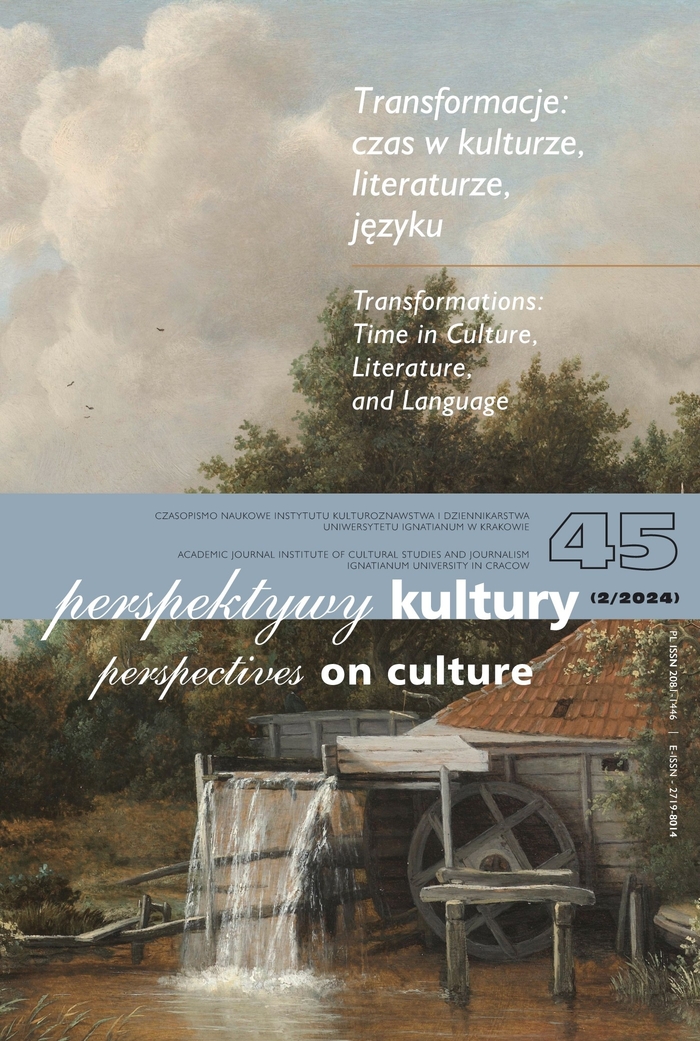Denegation, Textuality and Intertextuality in ”The Idiots”
Epistemological Transformation of Conrad’s Tale
Abstract
“The Idiots,” published as part of Conrad’s first collection of short stories Tales of Unrest (1898), is, by far, the most minimalist of all his tales, therefore dubbed “pointless” by one of his critics. As such, it has mostly occasioned contextual readings to date, purely literary approaches to the story being few and far between. The present article offers a transformative reappraisal of this deprecated Conrad tale, in considering its artistic texture. A combined textual and intertextual approach proposed here reveals the presence, also in this Conrad story, of the modernist device of denegation (assertion of presence by absence, and vice versa) usually ascribed to William Faulkner, which helps resolve the issue of the tale’s ambiguous ending by defining it as the main heroine’s accidental drowning rather than suicide as it is usually seen in Conrad criticism. In its epistemologically transformative role, denegation likewise removes the odium of senselessness from “The Idiots” by identifying its covert, because denegatively construed, taboo theme of incest. The intertextual (Bakhtinian) reading of the story in Kristeva’s understanding of the term, and therefore through recourse to a later writer, i.e., Faulkner, does not only confirm the presence of the theme of incest in “The Idiots” but also reveals the American modernist’s unacknowledged indebtedness to this Conrad tale for some of the key motifs, if not its overall theme, of his most famous novel The Sound and the Fury (1929).
References
Atkinson, William. (2015). “’The Idiots’ and The Savoy: Decadence and the Celtic Fringe.” Conradiana, no. 47(2), 113-131.
Baines, Jocelyn. (1986). Joseph Conrad: A Critical Biography. Harmondsworth: Penguin Books.
Billy, Ted. (1997). A Wilderness of Words: Closures and Disclosures in Conrad’s Short Fiction. Lubbock, Texas: Texas Tech U P.
Conrad Joseph. (1898/2012). “The Idiots.” In: Allan S. Simmons and J. H. Stape (eds.). Tales of Unrest. The Cambridge Edition of the Works of Joseph Conrad. Cambridge: Cambridge U P, 53-74.
Davies, Laurence. (2009). “’Don’t’ you think I am a lost soul?’: Conrad’s Early Stories in the Magazines.” Conradiana, no. 41(1), 7-28.
Erdinast-Vulcan, Daphne. (1999). The Strange Short Fiction of Joseph Conrad: Writing, Culture and Subjectivity. Oxford: Oxford U P.
Faulkner, William. (1936/1964). Absalom, Absalom! New York: Random House.
Faulkner, William. (1929/1956). The Sound and the Fury. New York: Vintage Books.
Harrington Burten, Ellen. (2011). “’Dead men have no children’ in Conrad’s ‘The Idiots’ and ‘Amy Foster.’” Conradiana, no. 43(2/3), 93-103.
Karl, Frederick R. and Davies, Laurence. (1983). The Collected Letters of Joseph Conrad. Vol. 1: 1861-1897. Cambridge: Cambridge U P.
Meyer, Bernard C. (1967). Joseph Conrad. A Psychoanalytic Biography. Princeton, NJ: Princeton U P.
Murfin, Ross and Ray, Supryia M. (2009). The Bedford Glossary of Critical and Literary
Terms. Boston, New York: Bedford/St. Martin’s.
Pitavy, François L. (1989). “Some Remarks on Negation and Denegation in William Faulkner’s Absalom, Absalom!” In: Lothar Hönninghausen (ed.). Faulkner’s Discourse: An International Symposium Tübingen: Max Niemeyer Verlag, 25-32.
White, Andrea. (2000). “’The Idiots’: ‘A Story of Brittany’ Under Metropolitan Eyes.” Conradiana, no. 32(1), 4-19.
Copyright (c) 2024 Perspectives on Culture

This work is licensed under a Creative Commons Attribution-NoDerivatives 4.0 International License.
Autor, zgłaszając swój artykuł, wyraża zgodę na korzystanie przez Wydawnictwo Uniwersystet Ignatianum z utworu na następujących polach eksploatacji:
- utrwalania utworu w formie papierowej, a także na nośniku cyfrowym lub magnetycznym;
- zwielokrotnienia utworu dowolną techniką, bez ograniczenia ilości wydań i liczby egzemplarzy;
- rozpowszechniania utworu i jego zwielokrotnionych egzemplarzy na jakimkolwiek nośniku, w tym wprowadzenia do obrotu, sprzedaży, użyczenia, najmu;
- wprowadzenia utworu do pamięci komputera;
- rozpowszechniania utworu w sieciach informatycznych, w tym w sieci Internet;
- publicznego wykonania, wystawienia, wyświetlenia, odtworzenia oraz nadawania i reemitowania, a także publicznego udostępniania utworu w taki sposób, aby każdy mógł mieć do niego dostęp w miejscu i czasie przez siebie wybranym.
Wydawca zobowiązuje się szanować osobiste prawa autorskie do utworu.





